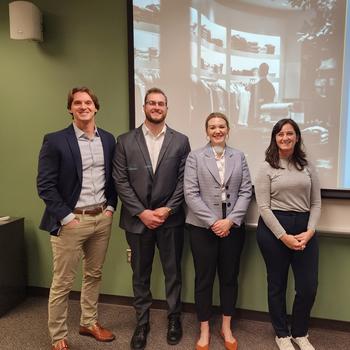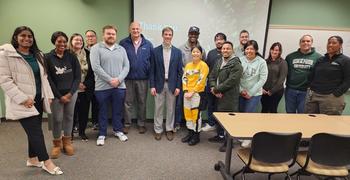When hearing the term “sustainability” in business circles, there’s often a misconception that it hinders growth. For the last three years, the MBA elective course Environmentally Sustainable Operations has offered interested graduate students from across George Mason University the opportunity to work with companies from multiple industries on making the business case for sustainability.

Sabrena Snow (Hyde), Rachel Edwards
Each year, new companies participate, mobilized by George Mason alumni, faculty and staff, and other community members. “I only need to have one conversation with them, and then they're on board,” says Ioannis Bellos, an associate professor of Information Systems and Operations Management (ISOM) at the Costello College of Business at George Mason University and director of the MBA Program; Bellos developed the course and has been teaching it since Spring 2022. This latest semester the course featured consulting projects with: Schneider Electric, 4P Foods, Hyde, MAXSA Innovations, and Future Acres Urban Farming.
Because of the partnership building done by Bellos and others at George Mason, this course offers an excellent experiential learning opportunity where students help real companies, gaining insight from the executives in the process. “It was an exceptional opportunity to mentor MBA students from George Mason’s Environmentally Sustainable Operations course,” says Kevin DeLeon, program manager of sustainability business at Schneider Electric. “We were excited to participate and offer students a glimpse into the practical aspect of driving sustainable improvements. This collaboration is a reflection of Schneider Electric’s mission to champion sustainability and our commitment to engaging and educating future leaders.”
MBA students Rachel Edwards and Jordan Heisen had previously participated in the Global Residency program at the Costello College of Business, where they visited Sweden and Denmark to meet with businesses in the sustainability field, sparking both of their interests in the subject. For their sustainable operations project, they joined fellow MBA student Dominic Leone to work with Hyde, a Washington, D.C., based company pioneering AI-driven solutions to combat excess inventory in the apparel industry. The three of them worked closely with Hyde representatives to examine ways they could make their practices more sustainable.
“Apparel clothing discarded in landfills is now visible from space,” says Sabrena Snow, Hyde’s vice president of partnerships and sustainability. “We began working with the Costello College of Business to really quantify the impact of excess inventory, and its disposal, on the environment.”
The team of Costello MBA students examined Hyde’s business practices to see how they could best help them.
“A lot of companies are pumping out new fashion trends,” says Leone. “If that trend is going to continue, how can we do it in a more sustainable way where we don’t overorder and have a crazy amount of excess inventory?”
Once a week, the team met with CEO Rahul Jindal and Snow. “Going through the paper with Hyde and hearing the feedback from both representatives, they were an incredible pleasure to work with,” says Heisen.
“By building a framework, and combining our EPA data, company interviews, and Hyde's proprietary data, the George Mason team was able to size the impact of producing and dumping excess apparel inventory in the United States,” says Snow.
The Hyde representatives took it a step further and connected the students with high-profile contacts from the fashion industry’s sustainability field. “When we started this project, Hyde was trying to get partners and funding,” says Edwards. “Being able to attach this white paper to any sort of funding that they’re trying to get later, this is their documentation of what’s going on.”
One of the community partners who worked to recruit participating companies for the course was Fairfax County Government’s Office of Environmental and Energy Coordination. “When we were approached about working with Professor Bellos, it seemed like a perfect opportunity for companies in our Green Business Partners program,” says Gina Weil, co-manager of the Green Business Partners program. “We know that green business is good business, and helping businesses identify both the economic and environmental benefits to adopting sustainable practices is central to our mission. We were thrilled to be able to connect his students with Future Acres Urban Farming, and we know the experience for the students and the company was incredibly positive and beneficial for both.” The mission of the Green Business Partners program is to support Fairfax County businesses in creating a carbon neutral economy through collaboration and learning opportunities that advance climate action.

MBA '23 (Partner at Environmental
Resources Management)
Though there was more to the course than this collaborative project, the experiential aspect brought the learning experience full circle. Bellos worked closely with the company representatives to ensure that their organizations got the most out of the projects.
Heisen appreciated how he explained case studies in the classroom. “He does a really great job of breaking down each case and ultimately getting you to thinking of another perspective,” he says. Sustainable operations lead to profit, says Edwards, “Unless it’s actually making money and it’s financially viable, there’s no reason for a company to do it.”
Recently, 68% of all prospective graduate students surveyed by the Graduate Management Admission Council said that sustainability is important or very important to them. This course is in direct response to this increasing market need.
If you want to learn more about how you can become a business leader with a sustainability mindset, please learn more about the Costello College of Business MBA program.
